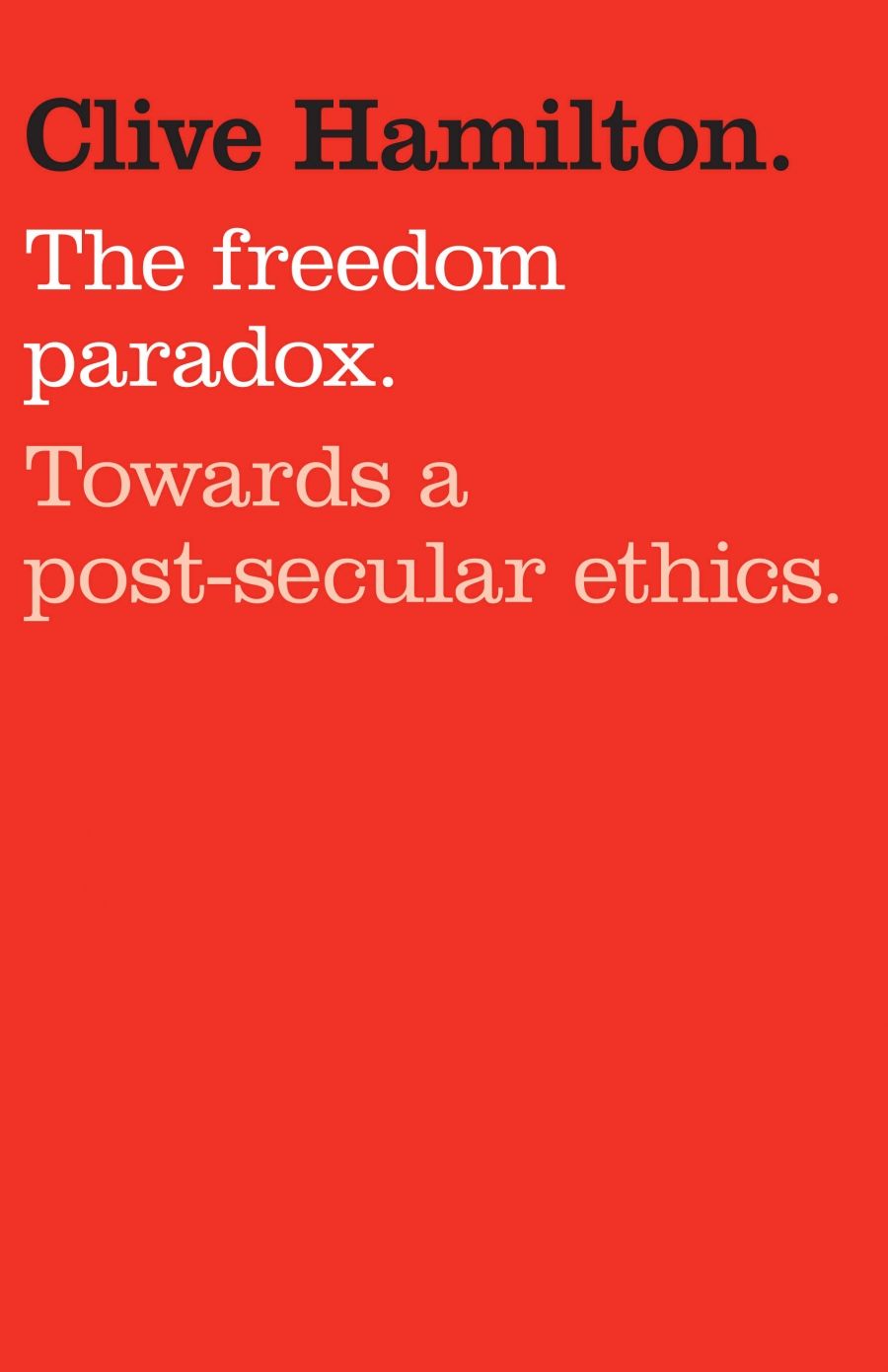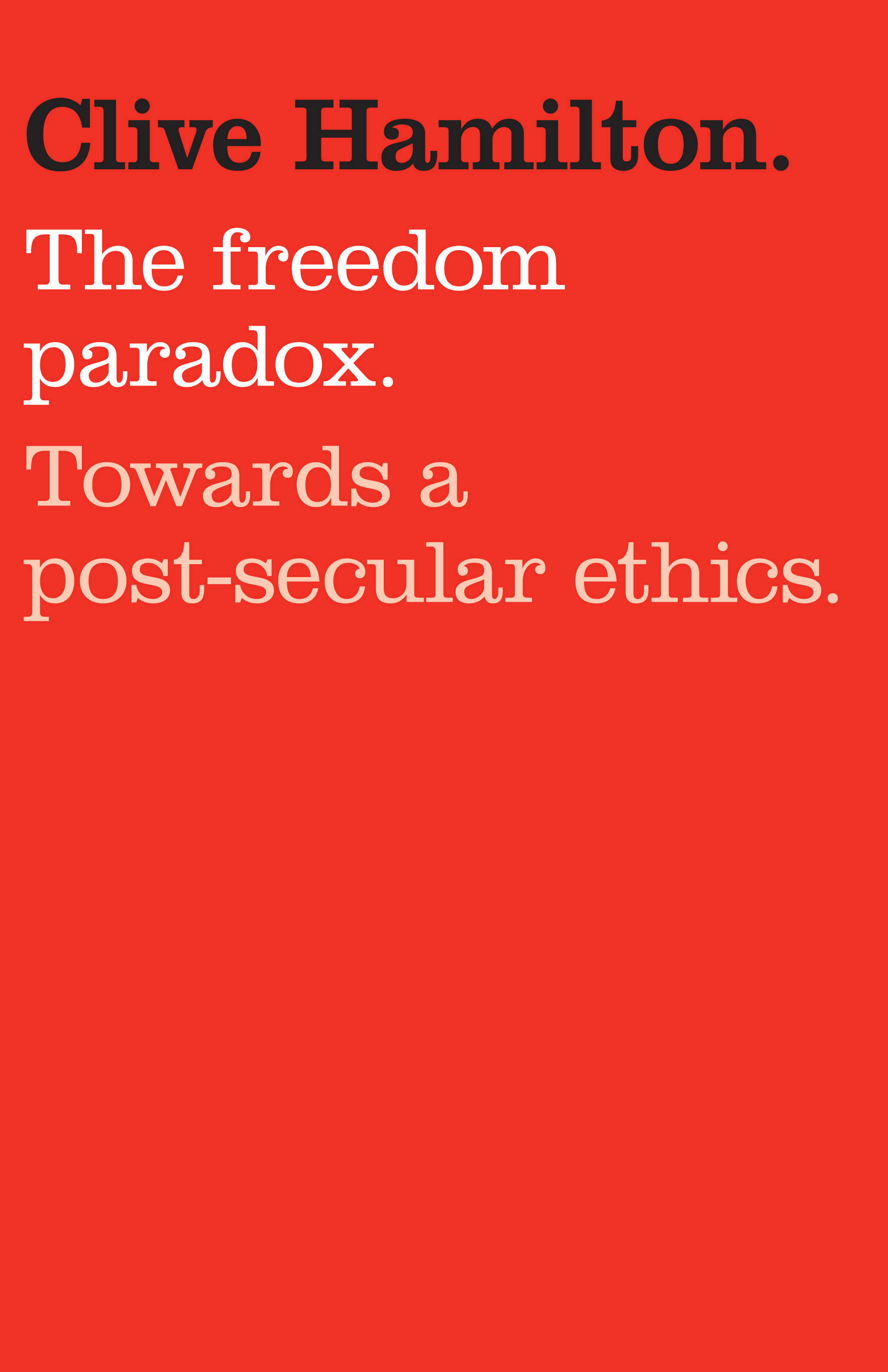
- Free Article: No
- Contents Category: Cultural Studies
- Custom Article Title: The wounded man
- Review Article: Yes
- Article Subtitle: The wounded man
- Online Only: No
- Custom Highlight Text:
Any summary of Clive Hamilton’s contributions to public debate thus far would focus on two themes: his savage criticism of modern society and its ‘fetish for growth’; and his rejection of contemporary politics, in particular the theory and practice of social democracy. He sees the implicit faith in growth and markets, and the avoidance of a realistic analysis of power, combining to ensure that modern politics is ineffective in tackling the causes and consequences of the contemporary epidemic of unhappiness.
- Book 1 Title: The Freedom Paradox
- Book 1 Subtitle: Towards a post-secular ethics
- Book 1 Biblio: Allen & Unwin, $35 pb, 274 pp
- Book 1 Cover Small (400 x 600):

- Book 1 Cover (800 x 1200):

The Freedom Paradox: Towards a Post-Secular Ethics continues this line of attack. Not only does Hamilton point to a ‘proliferation of the maladies of affluence’, such as depression, anxiety and compulsive behaviours, but also to ‘an ever-devouring conformity flimsily camouflaged by a veneer of confected individuality’. It is truly a case of ‘One-dimensional Man’: not surprisingly, Herbert Marcuse is quoted at the beginning of the book.
It is a world of saints and sinners, with very little in between. Hamilton attacks a major theorist of the social-democratic alternative, the American social and political philosopher John Rawls. There are eighteen references to Rawls in the book, most of them negative. Rawls’s theory of justice is criticised for its ‘abstractness’ and his philosophising attacked for mistaking the metaphysical for the intellectual. Rawls’s proceduralist ethic is said to be ‘every bit as lacking in humanity as the world of Milton Friedman and Gary Becker’. He is said to ‘provide no reason for the people to accept his conception of social justice and no motive to act morally in the world we actually inhabit’.
Strong stuff, but it invites the question – what is Clive Hamilton’s ‘world’? How does he provide people with a reason to act morally? His inspiration comes from the tradition of German idealism, in particular the thinking of Arthur Schopenhauer (1788–1860), who is recognised as the first Western philosopher ‘to appreciate the deep insights of the East’. Schopenhauer takes us beyond the appearance of things to a world that is ‘hidden behind nature, and renders nature possible’.
Hamilton takes up the distinction between appearance and reality, and milks it for all that it is worth. At the core of reality is a ‘moral sense’ which can be accessed by ‘non-sensible intuition’ or by ‘the innermost voice of conscience’. It is characterised by compassion and the will to justice. It is the ‘unity of all things’ and the ‘meaning’ within creation. With death ‘our phenomenal self’ disappears, but ‘our noumenal self, the universal self, is untouched’.
Hamilton is as critical of modern atheists such as Richard Dawkins and Christopher Hitchens as he is of the new fundamentalists of Christianity, Islam and Hinduism. His primary targets in this book are secularism and rationalism. Indeed, while he acknowledges the rationality of the decline of religion, he frets at its consequences for social solidarity:
The decline of the churches in Western countries has meant a loss of faith in the myths and metaphors that served to remind us of divine retribution. The consequence is a breach in our belief in the fairness of life, a gap that seems to have been filled by cynicism and selfishness.
Rationalism and utilitarianism, he says, are incapable of providing answers to ‘post-modern ethical questions’. Kant’s ‘categorical imperative’, Mill’s ‘harm principle’ and Rawls’s ‘principle of fairness’ are said to leave too much unsaid about genuine philanthropy, emotions as judgements, and eternal justice. All too often, ‘living, breathing humans’ are left out on the basis that reason is ‘the essence of humanity’.
However, like all philosophies that have as their starting point the dissolution of the contradictions that lie at the heart of the human condition, Hamilton leaves too much unsaid about the phenomenal world and its particularities. The source and meaning of ethics may be beyond self-interest, but does that mean we ought not to work out what it means to secure peace and justice in a less than perfect world? That is precisely what John Rawls seeks with his theory of justice. In asking people to imagine themselves behind a ‘veil of ignorance’, he is urging them to reflect on what it means to create a civilised life. It falls short of utopia, but it does deal with our collective (as opposed to our individual interests) in a most enlightening way. The same could be said for Mill and his reflections on liberty, the harm principle and the co-operative movement.
It is secularisation and the theories associated with it, including philosophical realism, that are presented as the cause of ‘the paradox of freedom’ in modern consumer society. Hamilton argues that ‘the widening gap between life in the phenomenal world and the noumenal ground of existence is thus at the root of the spread of selfishness’. It is a world that has lost touch with spiritual values. The link with secularisation is explained as follows: ‘The secularisation of society meant that, as the emptiness of affluence finally had to be confronted, there was nowhere to go except to return to a gloomy nihilism.’ According to Hamilton, the ‘will to believe’ has died in modern secular society and cannot be rescued without resort to metaphysics.
To imply a connection between secularisation and nihilism is a bold move. It is certainly the case that secularisation does not come without ambiguity, but to empty it of moral commitment is pushing the envelope too far. What we might understand by a secular world view involves not just a rejection of religion but also a belief in the possibility of human improvement. It is certainly critical of blind faith, but not of moral purpose. For the secular humanist, the very point of the modern sciences – physical, social and psychological – is to learn more in order to live better and more civilised lives.
At the level of philosophy, secularisation manifests itself in the traditions of informed agnosticism or scepticism. Agnostics call for careful consideration of the evidence when making a claim or proposing a course of action. For them the mystery of the universe is just that – a mystery. As conditioned and limited as they are, history and experience are still the best tests for individuals and the communities in which they live.
Interestingly, The Freedom Paradox is most instructive when it is using the results of the psychological and social sciences to examine the meaning of well-being and the dynamics of coercion in modern society. Hamilton demonstrates that by incorporating ‘the other’ in our thinking and practice, a deeper and more meaningful concept of freedom is revealed. Establishing this link between morality and happiness is important knowledge. However, what its further implications are for the individual and the community is far from obvious. Only through practice can we find out, and this means well-designed policies and programmes.
All too often, Hamilton writes as if the moral self is pre-packaged and given. Rather, it emerged with human consciousness and has developed with time and understanding, but never completely free from its dialectical relationship with self-interest. Such contradiction is at the core of human existence, to be battled with by each of us as individuals and by all of us in a community. Urging us to confront this task by asking questions and seeking evidence, the philosophers of the modern world didn’t open up the floodgates for nihilism; rather, they impelled us to keep our feet on the ground. Such openness also created the preconditions for mutual respect and ‘living with difference’.
This takes me to the question of what Hamilton’s post-secular ethics means for politics. This is territory he seems reluctant to enter, despite the fact that the tension between ‘utopia and reality’ has been an ever-present theme in the modern era, with the battles between conservatives, reformers and revolutionaries going to the heart of the ethical debate about means and ends. What such battles have taught us is that political and civil liberty, and the political skills of negotiation and compromise are more than just means to an end but are themselves practical manifestations of the moral self. Complacency may create room for tyranny, virtue can be its maker. On this point, see Bernard Crick’s brilliant tract In Defence of Politics (1962).
It is also interesting to note that each of the three ‘avatars of virtue’ whom Hamilton mentions – Mahatma Gandhi, Nelson Mandela and the Dalai Lama – had, or in the latter’s case have, very specific and modern objectives, namely the achievement of political and national freedom. They recognised that there is more to freedom than this, but on precisely what that freedom may be they differ. On the question of the means they used to achieve their ends, Hamilton is right to emphasise their opposition to dogma and sectarianism as a defining feature of their politics, but this could hardly be characterised as ‘post-secular’. Indeed, it locates them at the heart of the Enlightenment.
The Freedom Paradox is a study in search of the metaphysical bullet that will explain the failings of modern society. To give the moral self metaphysical ballast adds nothing to the argument, just as a belief or disbelief in God adds nothing to the strength or weakness of the various ideas and doctrines associated with religion or atheism. In reading this book, I was continually reminded of the Buddha’s attitude to metaphysics. He claimed that the person who insisted that metaphysical questions be answered before the path to enlightenment could be followed was like a wounded man who would not let a surgeon remove the arrow until he found out who shot the arrow, what his name was, and so on. Such a man would die before such answers could be found.


Comments powered by CComment